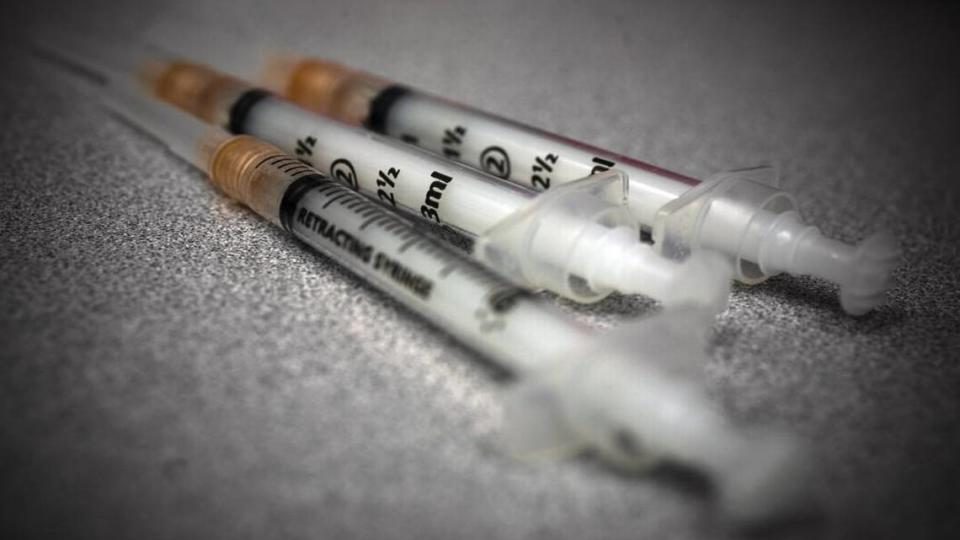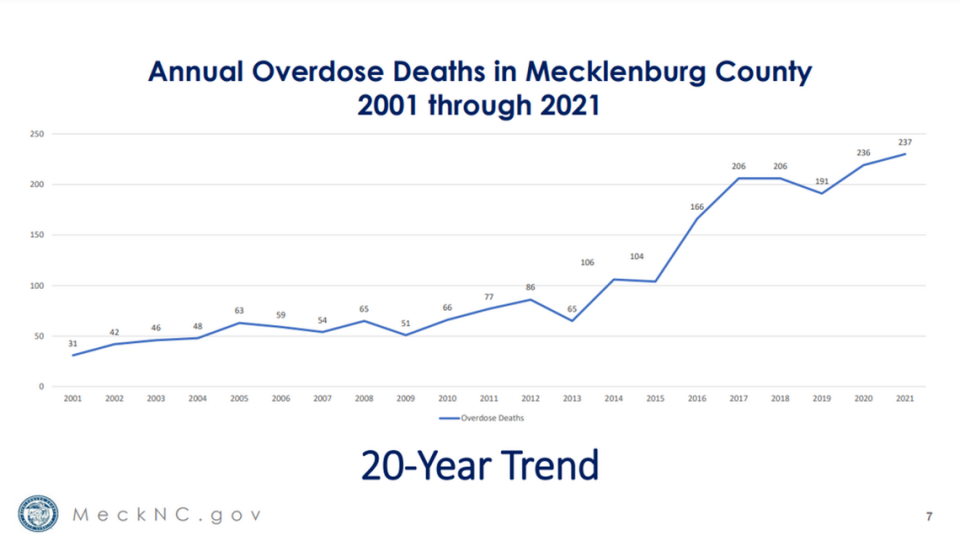Thousands of lives in NC ‘cut short’ by overdose deaths. What Mecklenburg plans to do
Pat Cotham has seen the effects of the opioid epidemic in Mecklenburg County funeral homes and churches.
The at-large county commissioner said she has attended funerals for college-educated men in their 20s, Charlotte-Mecklenburg Schools students and members of the LGBTQ+ community who all died from opioid overdoses.
Mecklenburg County Commissioners unanimously approved an interlocal agreement Tuesday with the city of Charlotte to spend nearly $11 million on opioid addiction support and prevention services by 2025.
The county and city received the funds from opioid lawsuit settlements. Charlotte and Mecklenburg are two of the thousands of local governments that teamed up to sue pharmaceutical companies after opioid overdose deaths rose drastically in the U.S. That includes 76 counties and eight municipalities in North Carolina.
Through the agreement, the county will lead funding distribution of the $72.7 million it’s expected to receive in settlements over the next 18 years. More money will be spent in the first few years of the distribution with exact amounts varying by year.
The initial $11 million is scheduled to be spent by June 30, 2025. The money will be spent on addiction treatment, syringe service programs, naloxone distribution, recovery and housing support.
The city of Charlotte gave the $14.4 million it received in the settlement to Mecklenburg County, which already has social service programs in place to address major issues — meaning the city would not have to hire additional staff.
“I want to thank them for their partnership,” County Commission Chair George Dunlap said. “Too many times people never acknowledge the city and county work together, but here is another example.”

How the money will be spent
Here is a breakdown of how the first round of funding will be spent:
▪ Naloxone distribution: Mecklenburg is allocating $330,000 for the distribution of naloxone, an overdose reversal drug sometimes known by its brand name, Narcan.
▪ Syringe services programs: The county will allocate $210,000 for the access to and disposal of sterile syringes and injection equipment and care for infectious diseases.
▪ Collaborative strategic planning: $350,000 for staff support and facilitation services.
▪ Employment-related services: $525,000 for job training, job skills, job placement, interview coaching, resume review, professional attire, relevant courses at community colleges or vocational schools, transportation services for those recovering from addiction.
▪ Recovery support services: $2 million for case management, harm reduction services and connecting people to addiction treatment.
▪ Early intervention: $2.25 million
▪ Addiction treatment: $2.25 million
▪ Recovery housing support: $3 million
Overdose deaths in North Carolina
From 2001 to 2021, more than 31,500 people died from a drug overdose in North Carolina.
“That’s more than two times the population of the town of Davidson, whose lives were cut short due to the opioid epidemic in the last 20 years in North Carolina,” said Robert Nesbit, chief of staff for Mecklenburg Consolidated Human Services.

In 2021 the crisis hit a boiling point in North Carolina, when about 2,205 people died from overdoses — about 11 each day.
“It’s a staggering number but that really doesn’t begin to capture the full number of people impacted, which is family members, friends, parents, husbands, wives, sons, daughters,” Nesbit said. “The national opioid settlement litigation is an effort to hold opioid manufacturers and distributors accountable for their actions and contributing to the opioid overdose epidemic.”
What are opioids?
Opioids include:
▪ Prescription pain relievers like OxyContin, Vicodin and Morphine
▪ Heroin
▪ Fentanyl
These drugs activate opioid receptors on nerve cells in the brain and body to relieve pain. Regular use of the drugs can lead to dependence and misuse can lead to addiction, overdose and death.
Nesbit and Commissioner Laura Meier both shared personal connections to addiction and substance abuse and noted the importance of breaking down the stigma. Substance use disorder is described as a chronic, relapsing condition.
“It’s something that you live with forever,” Meier said. “It’s not something that you just cure like a cold. It goes on and on.”
The majority of overdose deaths now involve illegal drugs, according to Nesbit’s report.

